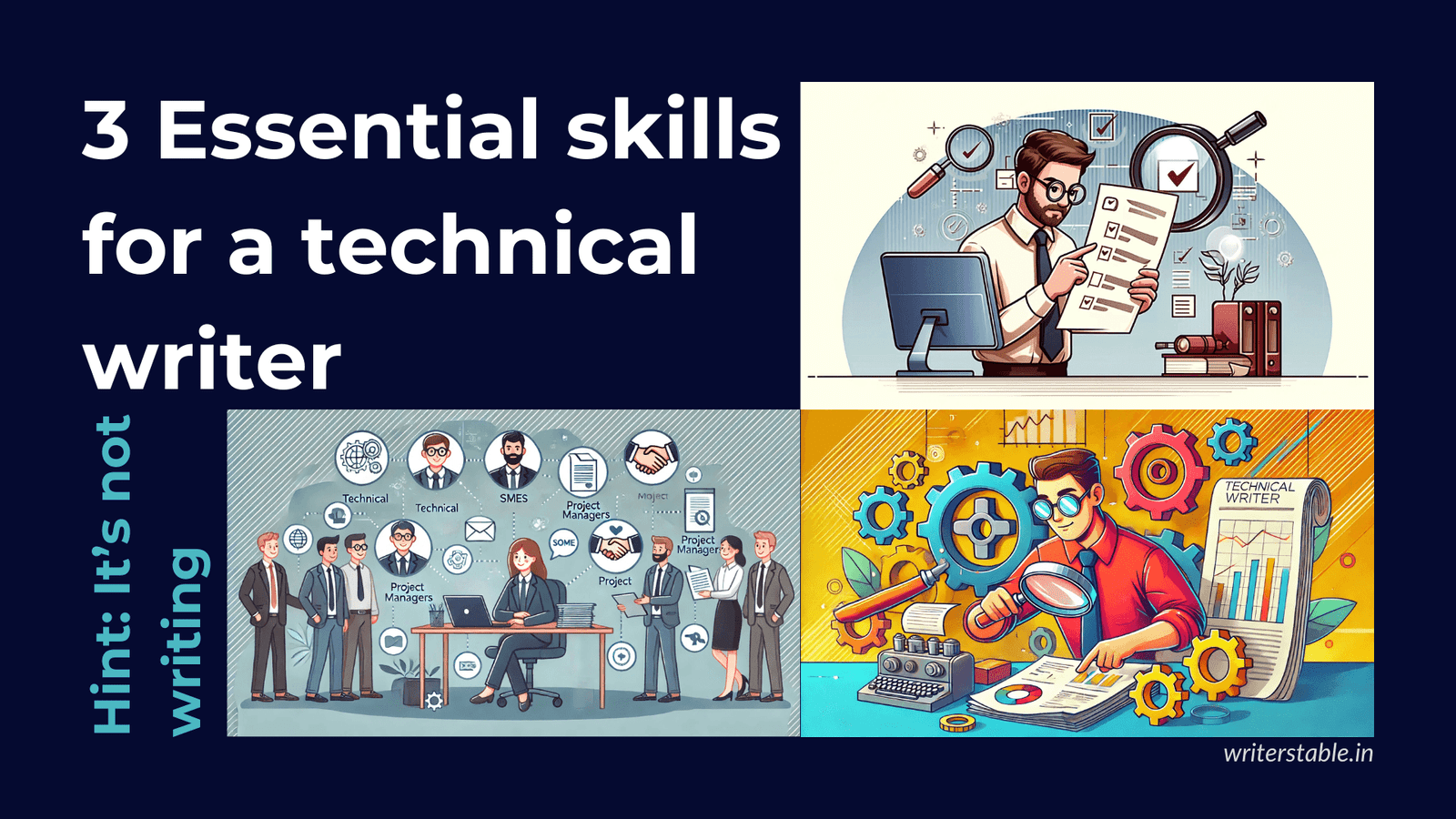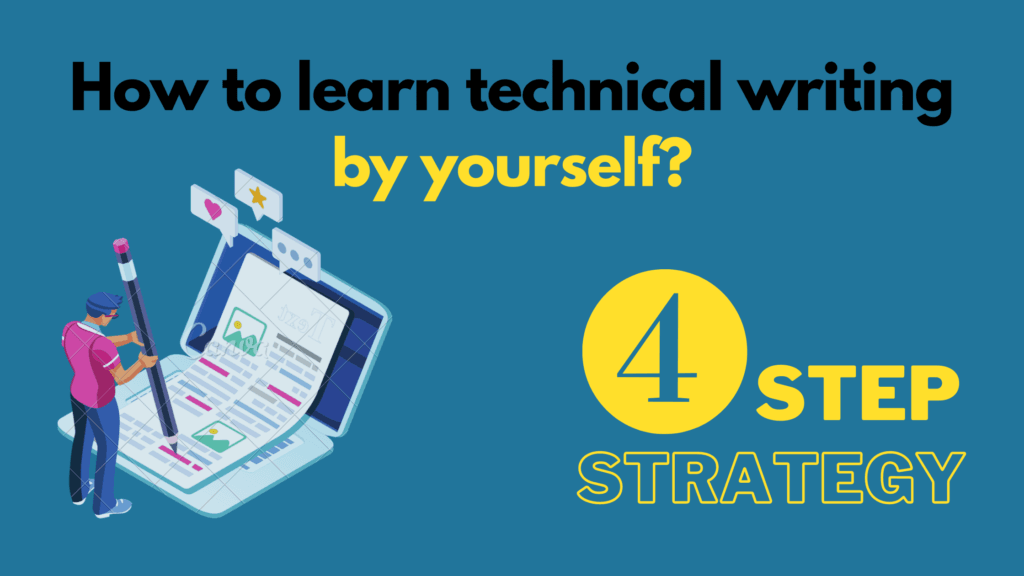In this article, I explore a few essential skills for a technical writer. Inculcate these skills to become a better technical writer.
Table of Contents
What are considered essential skills for a technical writer, but are not?
Good grip on the English language, good verbal communication, and great writing skills. These are the usual suspects when you think of the skills that make a good technical writer. Most HR also target these skills when hiring technical writers. They are certainly not wrong in doing so. But, those are just the basic skills in any technical writer, mediocre, and outstanding alike.
The skills that define an outstanding technical writer are far from those. Skills that are not immediately apparent, but play a vital role in the technical writer’s success!
What are the essential skills for a technical writer?
The essential skills for a technical writer are:
- Effective relationship management with stakeholders.
- Curiosity about the product or topic.
- Good attention to detail.
Effective relationship management with stakeholders
I have been guilty of managing this poorly in several projects and have seen its effect on my work. Cultivating a good relationship with project stakeholders, subject matter experts (SMEs), and fellow technical writers is critical to the timeliness of your deliverables as a technical writer. SME interviews and discussions are key to gathering information for a topic. So building a rapport with SMEs beforehand goes a long way in securing interviews or quick clarification with SMEs smoothly.

Remember, SMEs also review your work once it is completed. So, if you have a good working relationship with SMEs, your review requests will more likely be given priority. I’m not saying that they will drop everything on their plate to attend to you, but they will certainly keep your review or discussion requests in mind when planning their day. They will also be more forthcoming when sharing information and may even share product-related caveats, which are crucial for creating effective documentation.
Likewise, developing a good relationship with stakeholders allows you to build trust with them. Building trust is very important because if your deliverables are delayed for any reason, the stakeholders will be that much more understanding in accommodating you. This article in adoc-Studio explores a few types of stakeholders, their roles in your work, and tips on building a good relationship with them.
Lastly, building a good relationship with the other technical writers in your organization or team makes it easier to seek help when navigating new tools, even if you are working as an individual contributor!
Curiosity about the product or topic
Lazy technical writers document what they are told. Proactive technical writers document what they discover.
Let that sink in for a moment.
The more curious you are about the topic, the more effort you put into your research. Be it studying the design documents or interviewing SMEs. Coupled with good relationship management, your curiosity shines through in the thoroughness of your documentation.

Always be curious about the topic you are documenting. Ask yourself the following questions:
- Who is the user?
- Why does the user need this product or topic?
- What makes it work well?
- What makes it fail?
Let me explain how each of these questions helps.
Who is the user?
Answering the first question determines the level of detail in your documentation. You cannot know how to approach the documentation unless you understand the user or the target audience. Understanding the user also gives you topics of preliminary research that you must conduct.
For example, if I document a product that a developer uses to create an application, I know that the user is already aware of the product’s technology so I do not have to document how the product works. Furthermore, I look for the typical environment the user might use to execute the product and that leads me to research the environment and capture its caveats in my content.
In most cases, you will write for multiple types of users, instead of a single type of user. In these cases, it always helps to build user personas. Dividing your intended audience into multiple personas offers you unique insights into how each persona consumes information. Personas also help you identify what each type of user expects from the documentation you produce, thereby enabling you to address those expectations. This article discusses personas and how creating user personas can help tailor your documentation to meet specific user needs effectively..
Why does the user need this product or topic?
Answering the second question helps you understand the topic or product’s purpose, i.e. the problem the product solves. This in turn gives your documentation a purpose and direction. When your content addresses the problem and how the topic solves the problem, then it improves user experience by a great deal. Your documentation turns from the usual topic description and functions into an effective guide for all end-users.
What makes it work well?
Answering the third question helps you understand the features and functionality to target in your documentation. Through this, you can document procedures that are thorough, accurate, and useful. In addition to that, it also helps you document the ideal configurations required to utilize the product’s capabilities to the maximum.
What makes it fail?
Answering the last question gives you essential inputs for perhaps the most requested document of all, troubleshooting guides. No documentation is complete, effective, or even useful without a proper troubleshooting section. If you are able to document errors and error scenarios, you are arming the end-user with the information they need to unblock themselves without needing to contact customer support.
ClickHelp’s article about creating troubleshooting guides offers some useful tips and insight that may be useful to you.
Good attention to detail
Attention to detail is something you will build over time, so do not panic if you lack it initially.
As a technical writer, an SME is your primary source of information. But should you rely on this information alone? Every product has several nuances that might be overlooked or considered trivial by the SME but might become a bottleneck for the end-user. It is your job as a technical writer to look for these caveats.

This is especially useful when documenting procedures. Several steps are usually skipped or lost in translation. For example, the procedure to clone a repository in GitHub is fairly straightforward: open the repository, check out the main branch, and clone the repository. There is an invisible step here that most SMEs do as muscle memory. It is to ensure that the branch is relevant to their use case. If you are paying close attention to the procedure and trying it yourself, you are more likely to spot it. Technically, it adds just one more step in your procedure, but the effect it has on the end-user is significant.
Another aspect of documentation where attention to detail is vital is product compatibility with the user’s development or production environment.
SMEs don’t worry about it because their testing and development environment is configured to make the product work. But what if the end user’s environment is not configured similarly? So, as the technical writer, you ask the SMEs about the recommended configurations and the minimum configurations. You can also find out how a typical user can check their configuration and update it if required. A small step for a technical writer, but a giant leap for the end-user.
Conclusion and key takeaways
The essential skills for a technical writer are not their writing style, verbal communication, or understanding of the English language. Those are just the basic skills that any technical writer must possess. The skills that set a technical writer apart from their peers are:
- Effective stakeholder management: Being able to form and maintain effective relationships with stakeholders, SMEs, and peers.
- Curiosity: Being naturally curious about the product or topic they document. Their curiosity fuels their research, which in turn helps them discover aspects of the topic that might otherwise be overlooked.
- Attention to detail: Being able to discover nuances, hidden steps, and caveats by paying good attention to detail.
I hope you found this article helpful. If you didn’t, then I would love to hear from you about what I can do to improve it. For more technical writing-related articles and resources, see the Technical Writing page. Also consider following my YouTube channel learntechnicalwriting, Reddit community r/learntechnicalwriting and Quora space Technical Writer | Technical Writing for more such content.
FAQs about essential skills for technical writers
What skills do I need to be a technical writer?
The skills required to be a technical writer can be divided into basic foundational skills and essential skills that define an outstanding practitioner. Good verbal communication, good grip on the English language, and good writing skills make for a basic and mediocre. However, an outstanding technical writer goes beyond these basic skills. They cultivate attention to detail, curiosity about the feature or product they document, and great stakeholder relationships. These additional skills set them apart from the competition and help them create effective documentation.
How do I build a good working relationship with SMEs as a technical writer?
As a technical writer, your typical subject matter experts (SMEs) are project managers, product managers, developers, and product designers. They are your key sources of information as well as the signing-off authority of your work. A good way to build a functional working relationship with them is to build a rapport even before you need their input. You can identify your SMEs as soon as you join a team. Introduce yourself to them, explain your part in the team, and describe how your role impacts the product’s success. If they have never worked with technical writers before, it is also an excellent opportunity to briefly describe your typical workflow. This initial meeting goes a long way in building a great team.
Affiliate disclaimer: Some of the links in this article are affiliate links. This means that I can get a little commission if you subscribe or make purchases using the link at no extra cost to you.



Pingback: Effective documentation in technical writing | Resources for content creators and technical writers
Pingback: Creating Effective Documentation Is Easy - Writerstable
Pingback: Technical Writing Career FAQs for Beginners - Writerstable
Pingback: Concise writing: Unlock the secret to improving readability
Pingback: Top Free Writing Tools to Supercharge Your Writing Skills
Pingback: 8 Common Mistakes To Avoid When Starting A Career In Technical Writing